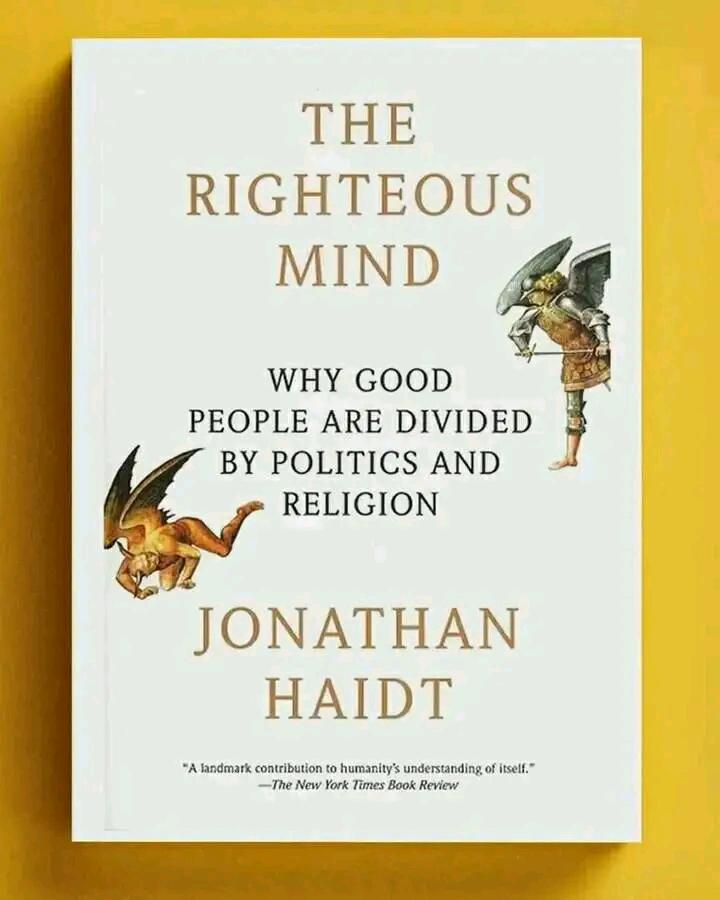Here are 7 lessons from the book "The Righteous Mind: Why Good People Are Divided by Politics and Religion" by Jonathan Haidt
1. Haidt introduces Moral Foundations Theory, which suggests that there are several innate moral foundations or principles that shape human morality. These include care/harm, fairness/cheating, loyalty/betrayal, authority/subversion, sanctity/degradation, and liberty/oppression.
2. The book argues that much of our moral reasoning is intuitive rather than rational. Our moral judgments often stem from gut feelings and emotional reactions rather than conscious deliberation.
3. Haidt proposes that different cultures and individuals prioritize these moral foundations differently, leading to moral diversity and sometimes moral conflicts. Understanding these differences can help bridge ideological divides.
4. Emotions play a significant role in shaping our moral judgments and decisions. Haidt explores how emotions such as disgust, empathy, and loyalty influence our moral reasoning.
5. Understanding the evolutionary origins of morality provides insights into why certain moral principles resonate with people.
6. Haidt examines the factors contributing to political polarization, emphasizing how differences in moral foundations and moral intuitions can lead to ideological divisions.
7. The book explores how confirmation bias—our tendency to seek and interpret information that confirms our existing beliefs—affects moral reasoning and reinforces ideological polarization.
1. Haidt introduces Moral Foundations Theory, which suggests that there are several innate moral foundations or principles that shape human morality. These include care/harm, fairness/cheating, loyalty/betrayal, authority/subversion, sanctity/degradation, and liberty/oppression.
2. The book argues that much of our moral reasoning is intuitive rather than rational. Our moral judgments often stem from gut feelings and emotional reactions rather than conscious deliberation.
3. Haidt proposes that different cultures and individuals prioritize these moral foundations differently, leading to moral diversity and sometimes moral conflicts. Understanding these differences can help bridge ideological divides.
4. Emotions play a significant role in shaping our moral judgments and decisions. Haidt explores how emotions such as disgust, empathy, and loyalty influence our moral reasoning.
5. Understanding the evolutionary origins of morality provides insights into why certain moral principles resonate with people.
6. Haidt examines the factors contributing to political polarization, emphasizing how differences in moral foundations and moral intuitions can lead to ideological divisions.
7. The book explores how confirmation bias—our tendency to seek and interpret information that confirms our existing beliefs—affects moral reasoning and reinforces ideological polarization.
Here are 7 lessons from the book "The Righteous Mind: Why Good People Are Divided by Politics and Religion" by Jonathan Haidt
1. Haidt introduces Moral Foundations Theory, which suggests that there are several innate moral foundations or principles that shape human morality. These include care/harm, fairness/cheating, loyalty/betrayal, authority/subversion, sanctity/degradation, and liberty/oppression.
2. The book argues that much of our moral reasoning is intuitive rather than rational. Our moral judgments often stem from gut feelings and emotional reactions rather than conscious deliberation.
3. Haidt proposes that different cultures and individuals prioritize these moral foundations differently, leading to moral diversity and sometimes moral conflicts. Understanding these differences can help bridge ideological divides.
4. Emotions play a significant role in shaping our moral judgments and decisions. Haidt explores how emotions such as disgust, empathy, and loyalty influence our moral reasoning.
5. Understanding the evolutionary origins of morality provides insights into why certain moral principles resonate with people.
6. Haidt examines the factors contributing to political polarization, emphasizing how differences in moral foundations and moral intuitions can lead to ideological divisions.
7. The book explores how confirmation bias—our tendency to seek and interpret information that confirms our existing beliefs—affects moral reasoning and reinforces ideological polarization.

